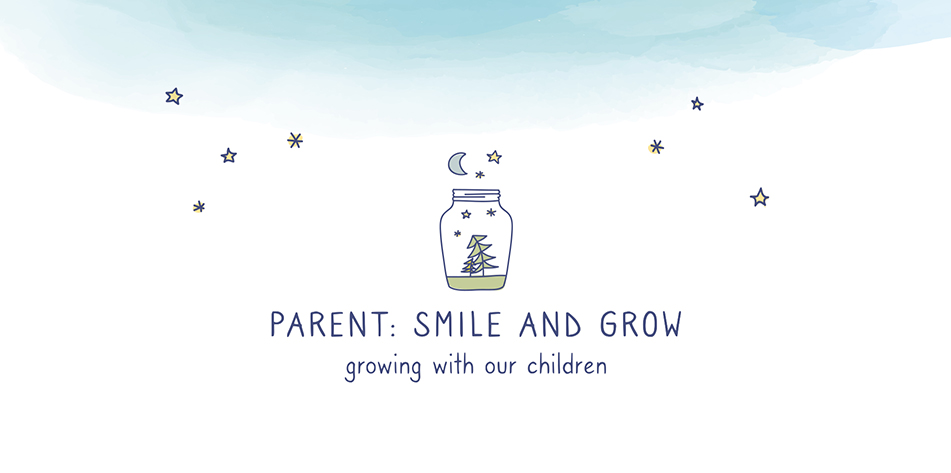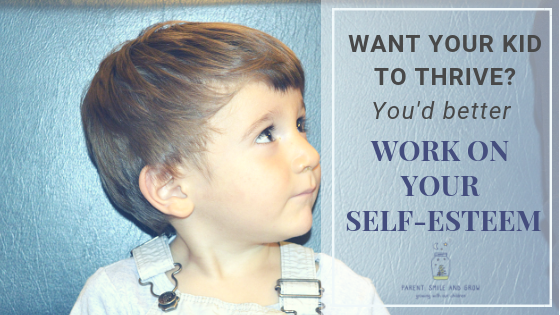You’ve always wanted to work on yourself and increase your self-esteem. And probably, you also aim at raising confident children. Because, especially if you’ve been suffering from your low self-esteem and the continuous self-criticism, you want to stop this negative cycle; and grow strong and self-assured kids. I have good news: you can increase your self-esteem! The bad news is, it’s going to take some time and energy. But the stakes are high: your kids’ confidence..
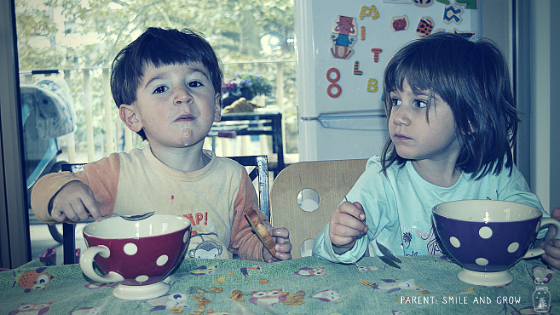
Table of Contents
I never make it right..
My daughter and I have the unfortunate tendency to distract ourselves easily and, as a result, to drop things down. Shall we call it clumsiness? But I purposely didn’t say that “We are clumsy“, and now you’ll see why.
You know those days when as soon as you get up, you’re in a hurry? You have a hard time waking up, so you’re late. You’d forgotten you had a very super important meeting; you selected the wrong program on your washing machine and now you don’t know what to wear. Your children sniff your undisguised nervousness, as a bloodhound who finds truffles..
And just when everything seems to be back on the rails, your daughter spills a whole cup of milk on the floor. And a few minutes later, she stumbles into his brother’s potty (no need to mention that it was still full, right?).
What would you do?
The key to all this talk about increasing your self-esteem is here. In your reaction in front of the “silly mistakes” of your children.
Why, what is self-esteem?
-
Feeling good about yourself.
-
Feeling accepted and loved.
-
Being proud of what you do – and then choosing actions and behaviors that are in line with what is important to you.
-
Believing in yourself, leaning on all your small (and maybe even great) successes.
The origins of self-esteem
Self-esteem is made of
- what we see of ourselves,
- how we define ourselves,
- what we believe of us.
This scaffolding is built, guess what?, during our childhood. Then, we keep modeling it out for life.
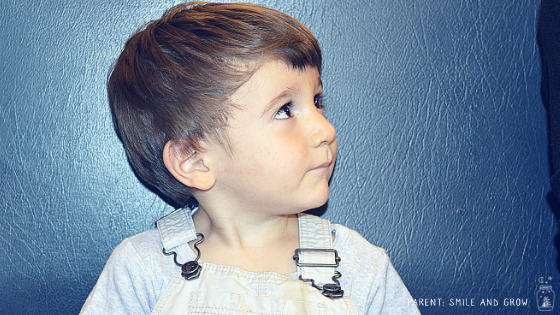
But let’s focus on the initial stage for a moment. Let’s consider those adults in our childhood who influenced the construction of this image.
Despite their unconditional love, some of their reactions to our successes or our mistakes may have undermined our self-esteem.
In short, what makes the difference is how this message of love is conveyed in everyday life.
Were you encouraged and praised when you were doing something good? And what about when you did wrong?
We tend to associate :
“Success = praise; Error or failure = reproach or punishment”
But the problem is that we get used to identifying ourselves with the result of our actions.
Think how many times you’ve felt ashamed because of a mistake you made. Have you stop trying, out of fear for failing? And then, you feel you deserve praise and demonstrations of affection only if and when you do something good.
Finally, we get used to giving labels, to tell ourselves “I’m a failure”; “I’m no good at anything.” We take one single episode, and we use it to determine a universal judgement: “I always drop things!” because you did it once.
Increase your self-esteem by changing the way you consider a mistake
How do you consider mistakes?
a) an opportunity to learn something; or
b) a demonstration of the fact that there is something wrong with you, that you are wrong?
If every time you stumble or spill something, you tell yourself “Gosh I’m so clumsy!”, you’ll convince yourself you really are.
And because by nature, our brains are led to prove what we believe in, well… You will continue to stumble, and then exclaim “It’s true, I’m really clumsy.”
Do you actually need to increase your self-esteem?
If you:
- always need external reassurances about your abilities;
- feel constantly threatened in your need for love and acceptance;
- seek others’ approval;
- struggle to say no, and clearly define your boundaries;
- make constant evidence of self-criticism;
- have troubles identifying your own needs.
Then, stick with me a little longer!
All this has a concrete influence on your choices and your daily actions.
For example, maybe you’ll choose a job or your studies not based on what you want, or what is important to you; but according to what will make you feel more accepted within your social group (family or friends or society as a whole).
Or, you’ll avoid doing certain things for fear of failing and judgement.
Then there’s the self-criticism.
Self-criticism is a double-edged sword:
-
As you keep criticizing yourself, you’ll need to hear the nice things about yourself from others;
-
You’ll also tend to be critical to others.
This ends up with a vicious cycle: when others fail to give you the approval you were seeking for, you’ll blame it on yourself, as a demonstration of your little value.
The Vicious circle
Let’s say you grew up in an environment that emphasized results, and therefore, you lack self-esteem a bit.
-
You now want to grow children who won’t suffer from your own issue.
-
Every time your child does something wrong, perhaps in public, you feel this inner conflict. Especially if you believe “child’s bad behavior = bad parent”; And if you seek others’ approval.
-
It’s difficult, under these circumstances, to consider the bad behavior as a fantastic learning opportunity!
-
And the cycle goes on?
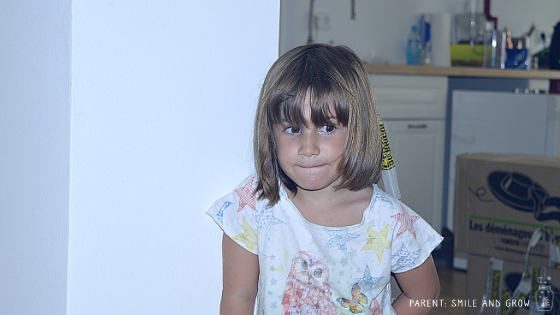
Small exercises to increase your self-esteem
Your words matter
Let’s go back to the spilled milk. (Well, that happens so often in my house!)
Remember what we said on other occasions about the fact that you can’t take care of others if you don’t care of yourself first?
So that’s very much reflected in the words you use. If, in your head, you spend the day unconsciously saying how clumsy you are, it’ll be difficult to change this vocabulary when you are under stress!
Try to think about the last time you made a mistake at work. How did your boss react? And how did it make you feel?
It is very likely that if he sustained you despite the mistake, you felt more motivated to do better; And conversely, if he commented out loud about your inability, you wanted to immediately resign.
So, for our inner dialogue, and with the way we talk to our children, it’s kind of the same thing.
This poster will remind you of the importance of.. Breathing Before you act!
Here’s a small exercise: imagine inviting a friend over for lunch. He/she inadvertently let his plate fall to the ground (you can even imagine the plate of your grandmother’s beautiful service, full of gravy or spaghetti’s sauce.) What would you say?
Write. Take a nice paper, and write down everything you’d say to your best friend.
Then, when you do something wrong, pick up the paper. Is the speech in your head the same? Or maybe you’re tougher with yourself than with your friend ?
The people around you
Have you never consciously noticed that certain people make you feel good, empowered, and others suck up all energy away?
If you’ve never thought about it, it’s worth doing the exercise, trying to figure out what it is that makes you feel good or bad.
And if a particular person systematically throws you down, try to avoid her if you can. In short, if it is true that we are the average of the 5 people we see most often, surround yourself as much as possible by the people you admire!
The importance of small things to increase your self-esteem
If you think about the definition of self-esteem, you will remember two important elements: be proud of what you do, and believe in yourself.
When do you take pride in yourself and learn to believe in you?
For example, when you achieve a goal. When you overcome an obstacle. Or learn something new.
The drawback is that when you have little self-esteem or you are super self-critical, you tend to avoid new challenges.
The key, in my opinion, is to change scale and perspective. A little bit like you do when you want to take on a new habit: it’s hard to lose weight if you suddenly eliminate EVERYTHING you like. You have to do it little by little.
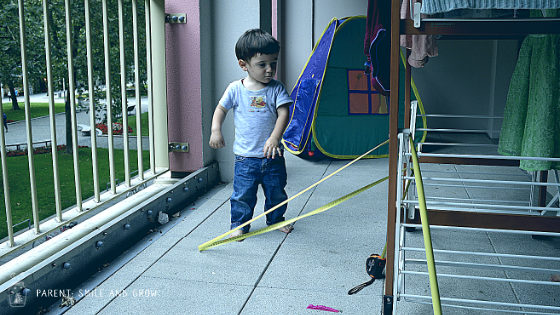
Small goals
If your son has a very low average in one subject, instead of threatening him to raise it to the top at the end of the school year, you can encourage him to increase his grade of just one point on his next test.
That way it’ll be easier for him to succeed, he’ll feel proud and motivated to continue.
I’d like to report a great example I heard from an Italian psychologist. If you are afraid of other people’s judgments, he said, you should train yourself into receiving it. Go to the local cafe, and when it’s packed with people, spill your coffee. On purpose. Talk to strangers. Train yourself, one step at a time.
Little new Things to learn
If you are scared of trying new things, start by putting yourself in a protected situation, where no one sees you, and then slowly but steadily increase the difficulty.
If you want to learn a foreign language, before following a political debate in the original language without subtitles you can maybe try to watch one of the first episodes of Peppa Pig you know by heart in your language.
Connected:the value of goal-setting for parents
Small, new habits
A positive vision of yourself goes through so many little things. In putting a little more care into how you dress yourself (Put the alarm clock 5 minutes before to dedicate yourself to this!).
In talking about you–and others–in a factual, non-judgmental way.
Try taking a piece of paper and spend 10 minutes before you go to sleep to write 3 things you’ve been happy about during your day. Since a new image of yourself is built over time, a little at a time; just as your first one as a child was formed episode after episode, one cup of spilled milk after another.
To increase your self-esteem, start loving imperfection
It always amazes me to see how, despite knowing that nothing is perfect in this world, we beat ourselves up when we fail showing a glittering perfection.
Wasn’t your newborn baby perfect in your eyes? Perfectly imperfect.
Aren’t you the perfect parent for your child? Perfectly imperfect.
Remember it more often.. Because
everything is perfectible, but nothing is perfect.
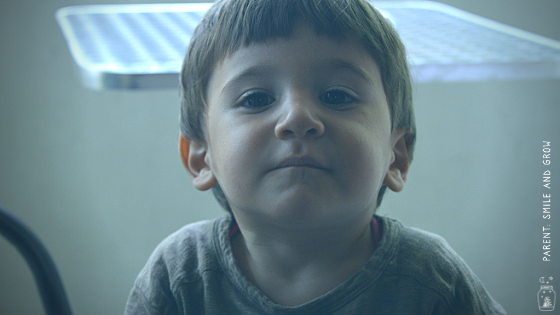
Mistakes, errors, failures, however painful, are nothing but an opportunity to learn something about ourselves, and to do better.
When my daughter, at the age of 5, started crying, saying, “I always drop everything !” I understood.
I don’t want that to be the image I reflect back. Let’s say, every time, “next time you’ll do better.” (And meanwhile, you’re learning how to clean..)
Resources and references
I share some articles I took as a reference, and useful readings as always! The links to Amazon on this page are affiliate links. (It means that if by chance, after clicking, you make a purchase, I’ll receive a small commission, without extra charge to you.)
But first, I ask you 3 things:
-
Share this post if you found it useful!
-
What do you think? I would love to read your experience 🙂
-
Did you like the article and are you interested in regularly receiving articles and suggestions directly in your inbox? This way!
Articles and books:
-
An interesting article about the definition of self-esteem
-
“[eafl id=”3299″ name=”The Self-Esteem Workbook US” text=”The Self-Esteem Workbook”]” is a best-seller program to guide you through gaining a better image of yourself.
-
“[eafl id=”3298″ name=”Positive Disciple Jane Nelsen US” text=”Positive Discipline”]” by Jane Nelsen is a complete pedagogical approach, but the goal is to raise conscious children in full respect of both the adult and the child.
